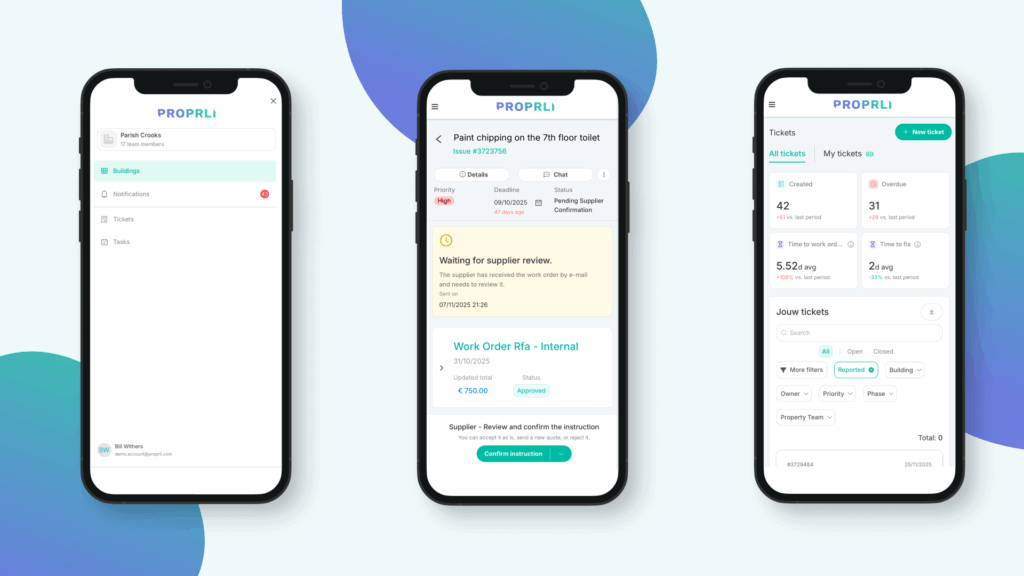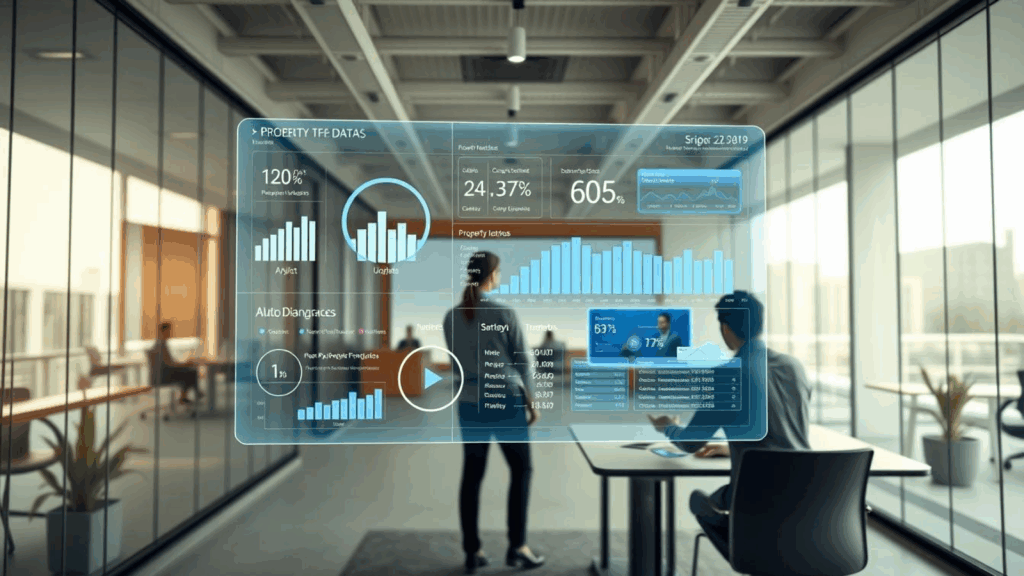The real estate sector has seen a profound digital shift, with proptech at the forefront. This technology merges advanced tools like artificial intelligence, virtual reality, and blockchain with traditional real estate methods. It offers new solutions for property transactions, research, marketing, and management. As the need for more efficient processes grows, grasping the essence of proptech and its role in property management becomes vital.
The proptech market has seen explosive growth, reaching $30.16 billion in 2022 and forecasted to soar to $133.05 billion by 2032. North America leads the proptech field, accounting for 56% of global initiatives. This surge underscores proptech’s role in transforming the real estate sector and its potential to revolutionize property management software and practices.
For technical property managers or asset managers, keeping abreast of proptech trends is essential. It’s crucial to understand how to harness these technologies to optimize operations and meet financial objectives. By embracing digital transformation, professionals can boost efficiency, elevate tenant satisfaction, and make informed decisions that benefit property owners and investors alike.
Key Takeaways
- Proptech combines real estate with advanced technologies to create innovative solutions for property management
- The proptech market is experiencing rapid growth, with North America leading the way
- Understanding proptech is crucial for technical property managers and asset managers to optimize operations and achieve financial goals
- Proptech has the potential to revolutionize property management software and practices
- Embracing digital transformation in real estate can enhance efficiency, improve tenant experiences, and facilitate data-driven decision-making
What is Proptech?
Proptech, short for property technology, is a rapidly growing sector that focuses on the integration of digital technologies in the real estate industry. It encompasses a wide range of innovative solutions designed to streamline and optimize various aspects of property management, construction, and real estate transactions. From smart buildings equipped with IoT sensors to construction tech that enhances efficiency and safety, proptech is revolutionizing the way we interact with the built environment.
One of the key areas of proptech is smart home technology, which enables homeowners and tenants to control various aspects of their living space through connected devices and mobile applications. Smart thermostats, lighting systems, and security solutions not only enhance comfort and convenience but also contribute to energy efficiency and cost savings. Real estate data analytics is another crucial component of proptech, leveraging advanced algorithms and machine learning to provide valuable insights into market trends, property valuations, and investment opportunities.
Proptech solutions cover a wide spectrum of real estate activities, including:
- Property search and listing platforms
- Virtual property tours and 3D visualizations
- Online rent payment and property management systems
- Predictive maintenance and asset management tools
- Crowdfunding and alternative financing options for real estate investments
The adoption of proptech has been accelerated by the changing consumer preferences and the need for greater efficiency in the real estate sector. As millennials and younger generations enter the housing market, they expect seamless digital experiences and on-demand services. Proptech startups and established real estate companies alike are investing heavily in developing innovative solutions to meet these evolving demands and stay competitive in the digital age.
The Evolution of Proptech
The property technology landscape has seen significant evolution over the last two decades. In the early 2000s, real estate marketplaces and portals emerged, marking the first disruption in the industry. These platforms combined technology with real estate, allowing properties to be showcased online and reaching a broader audience. This was the start of a new era in real estate innovation, setting the stage for further advancements.
Recent years have seen a rapid increase in the adoption of proptech and related technologies. Real estate businesses have recognized the potential of advanced technology to streamline operations, improve customer experiences, and open new opportunities. A 2018 study found that 93% of 270 real estate executives saw the need for proptech, with 90% believing it would positively impact their business.
The growth of proptech has been driven by several factors. Digital technologies like cloud computing, artificial intelligence, and IoT have provided a solid base for proptech solutions. These technologies have enabled the creation of sophisticated platforms and tools that streamline property management, enhance data analytics, and improve communication between stakeholders.
Changing consumer expectations and behaviors have also played a key role. Today’s consumers demand convenience, transparency, and personalized experiences in real estate services. Proptech solutions have met these demands with features like virtual property tours, online lease signing, and mobile apps for easy property management. By addressing these evolving consumer needs, proptech has become crucial for modern real estate operations.
The increasing globalization of real estate markets has further driven proptech growth. As investors and businesses expand globally, the need for efficient and scalable technology solutions has grown. Proptech platforms have emerged to facilitate cross-border transactions, provide market insights, and enable seamless collaboration between teams worldwide. This has made real estate more accessible and fostered greater transparency and efficiency in the industry.
The evolution of proptech has been transformative, reshaping how real estate professionals operate and interact with clients. As technology advances and market dynamics shift, the proptech landscape is set for even more innovation. Real estate businesses that embrace these trends and leverage proptech will be well-positioned to thrive in a competitive and dynamic industry.
Key Areas of Proptech
The proptech landscape is vast and diverse, covering a wide range of technologies. These solutions aim to revolutionize the real estate industry. From real estate technology to property management software and smart home technology, proptech is changing how properties are bought, sold, managed, and experienced.
The proptech ecosystem can be broadly categorized into seven distinct segments:
- Tools for Real Estate Agents and Brokers
- Solutions for Property Managers and Facility Operators
- Fintech
- Construction Tech
- Investment and VC Solutions
- Climate Tech
- Solutions Everyone Can Benefit From
The Residential Proptech Sector includes digital products for managing apartments and houses. These solutions use advanced technologies like artificial intelligence and the Internet of Things. They aim to streamline processes, enhance efficiency, and improve living experiences.
The Commercial Property Tech space is shaped by various tools and platforms. These include:
- Property search platforms
- Construction tech
- CRE CRM
- Evaluation and financing tools
- Facility management tools
- Space and asset management tools
These technologies aim to optimize commercial property management. They enable property managers to make data-driven decisions and improve tenant experiences. By using proptech, professionals in commercial real estate can stay competitive and adapt to market changes.
Benefits of Proptech for Property Managers
Proptech brings significant advantages to property managers, allowing them to streamline operations and make data-driven decisions. By adopting property management software, managers can automate tasks like lease management and rent collection. This automation saves time and minimizes errors, ensuring a more efficient process.
Real estate data analytics is a crucial part of proptech, empowering property managers. It provides insights into market trends and tenant preferences. This information aids in making informed decisions on rent pricing and property improvements. With real-time data, managers can quickly identify opportunities and risks, optimizing their operations.
Proptech also drives digital transformation in real estate, offering innovative tools to improve the tenant experience. Property managers can leverage proptech in various ways, such as:
- Utilizing sophisticated property search platforms to attract and engage potential tenants
- Incorporating virtual reality (VR) in property listings for immersive tours
- Hosting virtual open houses via livestream for remote or overseas buyers
- Employing photo software to highlight property features
- Using real-time communication tools to address tenant inquiries promptly
By embracing proptech, property managers can stand out in a competitive market. They can attract quality tenants and build lasting relationships. Proptech also allows managers to handle most processes through smartphones, enhancing convenience and efficiency for all parties involved.
Proptech’s Impact on the Real Estate Industry
The real estate sector is undergoing a significant digital transformation. Property technology trends are driving innovation and reshaping the industry. Proptech solutions are streamlining processes, enhancing efficiency, and improving the overall experience for all stakeholders.
The COVID-19 pandemic has accelerated the adoption of proptech. A significant majority of proptech investors and CEOs believe the crisis will increase technology adoption. Yet, only one-third of real estate businesses have a strategy for implementing technology in the future.
Deloitte’s 2021 Commercial Real Estate Outlook reveals a gap in digital readiness. Only 33% of commercial real estate businesses believe they have the necessary skills and resources. Furthermore, only 41% have started to redefine their business processes and job roles to incorporate technology.
The impact of proptech on the real estate industry is profound. It influences key areas such as:
- Enhanced property management through automation and data-driven decision making
- Improved tenant experience with smart building technologies and digital communication platforms
- Streamlined investment processes and increased transparency through blockchain and crowdfunding platforms
- More accurate property valuations and market insights through big data analytics and artificial intelligence
The following table highlights some of the most significant proptech trends and their potential impact on the real estate industry:
| Proptech Trend | Impact on Real Estate Industry |
|---|---|
| Internet of Things (IoT) | Enables smart buildings, energy efficiency, and predictive maintenance |
| Artificial Intelligence (AI) | Enhances decision making, automates processes, and improves customer service |
| Virtual and Augmented Reality (VR/AR) | Facilitates remote property viewings and immersive design experiences |
| Blockchain | Increases transparency, security, and efficiency in transactions and record-keeping |
As proptech evolves, embracing digital transformation and adopting innovative property technology trends is crucial. Real estate businesses must adapt to remain competitive and meet the changing needs of their clients and stakeholders.
Challenges and Limitations of Proptech
Proptech has immense potential to transform the real estate industry, yet it faces significant challenges. The slow adoption rate, especially among small and medium-sized businesses (SMBs), is a major hurdle. Many SMBs lack the financial means and expertise to effectively implement proptech solutions.
The real estate technology landscape is highly fragmented. With numerous startups and established companies offering diverse solutions, property managers find it hard to choose the right tools. This fragmentation can cause compatibility issues, making seamless integration and data exchange difficult.
Data privacy and security are critical limitations in proptech adoption. Real estate technology heavily relies on data collection and analysis. Ensuring the protection of sensitive information is essential. Property managers must adhere to strict data protection regulations and implement strong security measures to protect their clients’ data.
While proptech offers many benefits, it cannot fully replace the human touch. Building strong relationships with tenants and understanding their unique needs are crucial. Property managers must find a balance between technology and human connection.
Despite these challenges, the real estate industry acknowledges the need for digital transformation. By working together, educating, and making strategic investments, property managers can overcome these hurdles. This will allow them to fully leverage proptech’s potential, enhancing their operations and delivering outstanding service to clients.
Future Trends in Proptech
The real estate sector is rapidly adopting innovation, with property technology trends leading the charge. These advancements are transforming property management and investment, enhancing efficiency, transparency, and profitability. Several key trends are set to dominate the proptech landscape in the years ahead.
- Big Data and Analytics
The real estate industry’s data explosion has created new opportunities. Proptech solutions now use big data and analytics to offer insights into market trends, customer behavior, and property performance. This data-driven approach aids in making informed decisions, assessing risks, and optimizing portfolios.
- Artificial Intelligence and Machine Learning
AI and machine learning are reshaping property management, from predictive maintenance to tenant screening. These technologies analyze vast data sets to identify patterns and predict outcomes. For instance, AI chatbots handle tenant inquiries, while machine learning optimizes energy use and cuts costs.
- Internet of Things (IoT)
The IoT is transforming property management by enabling smart buildings. Sensors and systems monitor and control various aspects, like energy and security. This real-time data collection enhances management, efficiency, and tenant experiences.
The convergence of these trends is driving innovation in real estate. Property managers and investors who adopt these advancements will lead the industry. They will capitalize on the benefits of proptech.
| Proptech Trend | Key Benefits |
|---|---|
| Big Data and Analytics | Informed decision-making, risk assessment, portfolio optimization |
| Artificial Intelligence and Machine Learning | Predictive maintenance, tenant screening, automation of repetitive tasks |
| Internet of Things (IoT) | Connected and smart buildings, proactive management, enhanced tenant experiences |
As proptech evolves, it’s crucial for property managers and investors to stay updated. Adopting innovative solutions can streamline operations, boost efficiency, and drive growth. By leveraging technology, the real estate industry can unlock new opportunities and create a sustainable, prosperous future.
Proptech Definition: A Comprehensive Overview
Proptech, short for property technology, covers a wide range of digital tools used by real estate professionals. These tools aim to streamline and optimize the property transaction cycle. From researching properties to listing, buying, and selling, proptech solutions are changing the real estate industry. The drive for efficiency, transparency, and customer focus is behind this digital transformation.
Proptech platforms transformed property search and interaction. They offer vast databases of listings, detailed information, virtual tours, and user reviews. By using big data and machine learning, these platforms provide personalized recommendations, enhancing the user experience.
Property management software is a key part of proptech. These tools help manage residential, office, and retail properties. They automate tasks such as tenant screening, lease management, maintenance tracking, and financial reporting. This automation and real-time data insights empower property managers to make informed decisions and deliver superior service.
Smart building technology is also part of proptech. It uses IoT and advanced analytics to optimize building performance. Tools like smart sensors, energy management systems, and predictive maintenance tools help reduce costs, improve efficiency, and enhance tenant satisfaction.
The proptech definition will likely grow as the real estate industry evolves. Staying informed about new trends and evaluating their impact is crucial. By embracing proptech, property professionals can thrive in a competitive, tech-driven market.
Conclusion
The emergence of proptech marks a significant shift in the real estate landscape. It brings about a new era of digital transformation. Property managers and investors can now tap into unprecedented growth, efficiency, and innovation. Proptech encompasses a broad spectrum of advanced solutions, including big data analytics, AI, virtual reality, and blockchain.
As the real estate sector evolves, proptech’s role becomes more vital. Adopting these technologies enables property managers to enhance operations and client experiences. Investors, on the other hand, can make informed decisions and maximize returns through data-driven strategies.
To fully harness proptech’s potential, real estate professionals must be open to change and invest in digital transformation. This necessitates a proactive stance on technology adoption and a commitment to ongoing learning. By staying updated with the latest proptech solutions, they can thrive in a competitive and dynamic market.
FAQ
What is proptech?
Proptech, short for property technology, merges real estate with advanced technologies like AI, VR, and blockchain. It aims to improve property transactions by offering digital solutions. These tools are essential for real estate professionals at every stage of property dealings.
How has proptech evolved over the years?
Initially, proptech companies like real estate portals disrupted the market in the 2000s. They allowed online property showcases. Since then, proptech has significantly disrupted the industry, pushing businesses to adopt advanced technologies to remain competitive.
What are the key areas of proptech?
Proptech spans seven key areas: tools for agents and brokers, property management solutions, fintech, construction tech, investment solutions, climate tech, and general solutions. It impacts both residential and commercial real estate.
How can property managers benefit from proptech?
Proptech helps property managers streamline operations and make informed decisions. They can leverage platforms for sophisticated property searches, use VR for virtual tours, and enhance property images with photo software.
What impact has the COVID-19 pandemic had on proptech adoption?
The pandemic has boosted proptech adoption, with 89% of investors and 84% of CEOs seeing increased adoption. Yet, only one-third of real estate businesses have a tech adoption strategy for the future.
What are some challenges and limitations of proptech?
Despite growth, proptech faces challenges in implementation and adoption. Small- and medium-sized businesses often lack funds for digital upgrades. Managed services are used to aid in strategy and implementation.
What are some future trends in proptech?
Proptech’s influence on real estate will grow as businesses invest in advancements. Trends include increased use of big data, automation, and AI for management and investment decisions.






